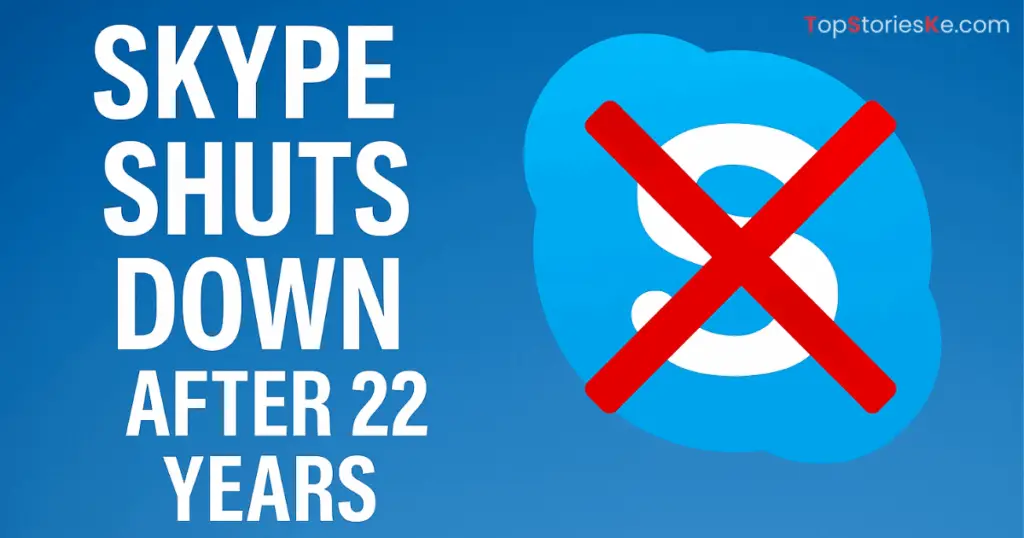After more than two decades of connecting people worldwide, Skype Shuts Down operations as of May 5, 2025. Once the undisputed king of internet calling, Skype now bows out, leaving behind a legacy of innovation and a trail of nostalgia for millions who grew up using its signature ringtone and interface.
A Pioneer in digital Communication
Skype launched in 2003 and quickly became a household name. At a time when long-distance phone calls were expensive and inconvenient, Skype disrupted the market by offering free voice and video calls over the internet. It was a groundbreaking solution that changed the way families, friends, and businesses communicated.
By 2011, Microsoft saw the platform’s potential and acquired it for a staggering $8.5 billion. Under Microsoft’s wing, Skype expanded further, integrating with Windows products and attempting to remain the go-to app for online communication.
The Decline in popularity
Despite its strong start, Skype began losing ground in the 2010s. Newer, faster, and more user-friendly platforms emerged, such as Zoom, WhatsApp, Google Meet, FaceTime, and even Microsoft Teams—ironically, Skype’s in-house competition. These platforms capitalized on mobile-first design, better user interfaces, and pandemic-driven demand for virtual meetings.
By 2020, Skype’s user base had dwindled to around 23 million monthly active users, a sharp drop from its peak of over 300 million. Users complained about its outdated design, lag issues, and a lack of innovation. While Skype had pioneered video calls, it struggled to keep up with a rapidly changing tech landscape.
Microsoft’s strategic Shift
In February 2025, Microsoft officially announced that Skype would be retired on May 5. The decision was part of the company’s broader move to consolidate communication tools under Microsoft Teams, a more modern and integrated platform.
Teams has become Microsoft’s flagship product for meetings, chats, and collaboration. It offers real-time file sharing, seamless integration with Office 365, and enterprise-grade security—features Skype could not fully provide.
According to The Guardian, Microsoft encouraged users to migrate their Skype accounts, chats, and contacts to Teams using their existing login credentials. For those unwilling to make the switch, a manual data export option remains available until January 2026, after which all Skype data will be permanently deleted.
The legacy of Skype
Although the platform is now defunct, Skype’s impact on the world of communication is undeniable. It helped shrink global distances, allowing millions to stay in touch across countries and continents. It also laid the groundwork for the technology behind today’s video conferencing tools.
“Skype was revolutionary. It normalized the idea of talking to your screen instead of through a phone line,” one user reflected on X (formerly Twitter). “It’s the end of an era.”
Skype’s role during pivotal moments—such as the COVID-19 pandemic or long-distance relationships—cannot be overstated. Many used it to attend remote weddings, say final goodbyes, or land job interviews.
Alternatives and What’s Next
Now that Skype has shut its doors, Microsoft is steering users toward Teams as the official alternative. Other popular options include:
- Zoom – Ideal for large meetings and webinars
- WhatsApp – Great for quick calls and texts with friends
- Google Meet – Seamless for those in the Google ecosystem
- FaceTime – A favorite among Apple users
You can check out this AP News guide for more on Skype alternatives.
It’s worth noting that Skype for Business, which serves enterprise clients, will continue operating for now, though it is expected to be phased out in the future as well.
Final Thoughts
The closure of Skype marks the end of a significant chapter in tech history. For many, Skype was the first taste of truly free global communication. Its ringtone, its simple blue interface, and the feeling of watching loved ones appear on screen for the first time—all of it now lives in memory.
As the digital world evolves, so too must the tools we use. Skype may be gone, but it laid the foundation for what we use today. And that legacy is something to celebrate.
Read More:
- Why Microsoft Chose Teams Over Skype
- How Skype Shaped Remote Work Culture
- Tips for Migrating from Skype to Microsoft Teams
Follow TopStoriesKe for more.



